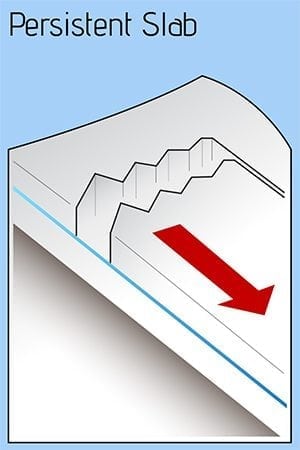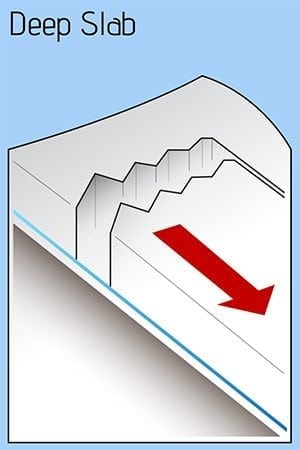Valdez
Above 4,000ftConsiderable
2,000 to 4,000ftModerate
Below 2,000ftLow
Degrees of Avalanche Danger
Avalanche Problems
Problem 1
A very strong inversion is currently moving into place that is pushing temperatures well above freezing at upper elevations. Nicks weather station was recording 38° at 4200′ at 5 am. Unusual weather can produce unusual avalanche patterns. This will be the first time temperatures have gone above freezing above 4000′ in a long time. Density changes within the most recent storm or buried surface hoar down 2-3 feet may become reactive today.
Buried surface hoar exists around 2-3 feet deep in the intermountain and continental zones on all aspects above 2500′. A significant natural avalanche cycle during the 1/23-25 storm (see avalanche activity section) occurred at this interface. This layer was found to be reactive in stability tests at ~5000′ On Girls glacier as recently as 1/27. Above freezing temperatures at upper elevations will be adding stress to weak snow increasing the likelihood of human triggered avalanches up to 3 feet in depth.
Signs of instability may not exist even when dangerous conditions are present. Digging snowpits is the most effective way to identify where this layer is present and its sensitivity. Although, this can be a difficult assessment tool due to spatial variability (conditions that vary from place to place) and results that may be confusing or misleading.
Likelihood:
- Almost Certain
- Very Likely
- Likely
- Possible
- Unlikely
Size:
- Historic
- Very Large
- Large
- Small
Trend
- Increasing
- Steady
- Decreasing
Problem 2
Weak snow exists near the base of our snowpack in all three climate zones. Recent heavy snowfall and rising temperatures has increased the stress upon this weak snow. The likelihood of deep human triggered avalanches has gone from unlikely to possible. This layer will be difficult to directly affect by a person or machine but a persistent slab avalanche (see problem 1) may be able to step down to deep layers in our snowpack. DOT avalanche mitigation efforts did just this on the buttress to the east of nicks(see avalanche activity section), showing that it is still possible for deep layers to produce avalanches.
Likelihood:
- Almost Certain
- Very Likely
- Likely
- Possible
- Unlikely
Size:
- Historic
- Very Large
- Large
- Small
Trend
- Increasing
- Steady
- Decreasing
Avalanche Activity
Below is a summary of observed Avalanche activity from the last 7 days. Avalanches that were noted earlier in the season can be viewed by clicking the link below.
If you trigger or observe a natural avalanche consider leaving a public observation.
1/26- A significant amount of avalanche activity occurred during the 1/23-25 storm. Avalanches were concentrated in the Intermountain and Continental zone and occurred on all aspects above 2000′. Most of the activity appears to have failed mid storm with crowns filled back in. Notable avalanches occurred on: Crudbusters, Iguana Backs, Nicks Butress (artillery triggered), Gully 2 buttress, Little Girls, Easter Bunny, Averys.
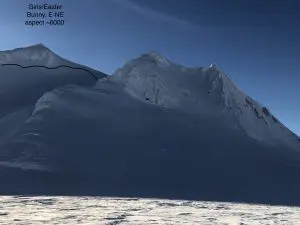
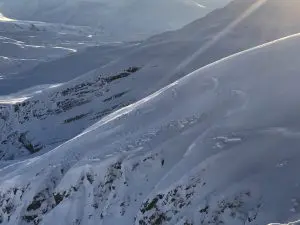
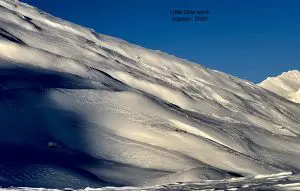
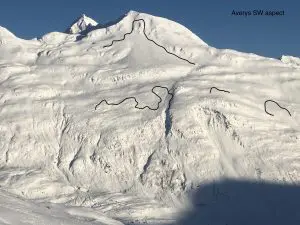
Crudbusters north aspect ~4500′ SS-N-R2-D2.5
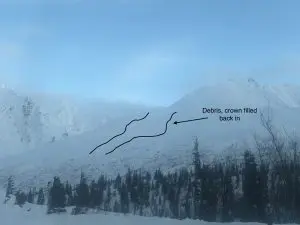
Hippie Ridge south aspect ~4000′ -SS-Ny-R1-D2
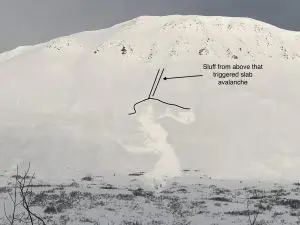
Giovanni (Buttress east of Nicks Happy Valley)north aspect ~3600′ SS-AA-R3-D3. DOT avalanche control work triggered a large soft slab avalanche that stepped down to weak snow near the ground half way through the path.
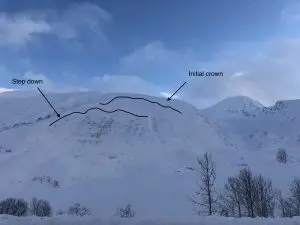
Buttress between Nick and Gully 2. north-northwest aspect ~3500′ SS-N-R4-D2.5
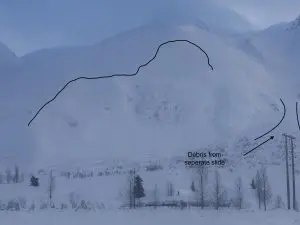
1/21- Several D2 natural avalanches were observed on wind loaded slopes that failed at the 1/14 BSH interface. These probably occurred on 1/19. Avalanches were observed on Hippie Ridge South aspect, RFS Northwest aspect, Cracked Ice Northwest aspect and Python (Cherry couloir) East aspect. These all appeared to be 1-2 feet deep.
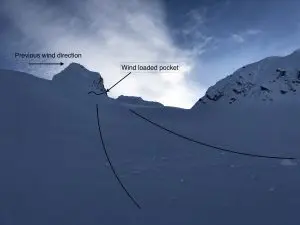
Weather
Check out our updated weather tab! A collection of local weather stations are available for viewing with graphs and tabular data included.
NWS Watches and warnings
NONE NWS Point forecast for Thompson Pass
Date Saturday 01/28/23 Sunday 01/29/23 Time (LT) 06 12 18 00 06 12 18 00 06 Cloud Cover SC OV SC SC BK OV OV OV OV Cloud Cover (%) 45 95 40 40 65 85 90 95 80 Temperature 23 28 28 22 22 27 29 26 23 Max/Min Temp 31 22 31 22 Wind Dir W SW SW SW SW SW SW S S Wind (mph) 3 3 2 4 6 8 4 3 3 Wind Gust (mph) Precip Prob (%) 0 0 5 5 10 50 40 60 50 Precip Type S S S S 12 Hour QPF 0.00 0.00 0.04 0.05 12 Hour Snow 0.0 0.0 0.0 0.3 Snow Level (kft) 1.8 2.1 2.1 1.9 1.6 1.1 1.1 1.0 0.9
Click on link below for Thompson Pass weather history graph:

| Date:
01/28 |
24 hr snow | HN24W* | High temp | Low temp | 72 hour SWE* | January snowfall | Seasonal snowfall | Snowpack Depth |
| Valdez | 0 | 0 | 31 | 23 | .72 | 39 | 136 | 47 |
| Thompson pass | 0 | 0 | 24 | 17 | N/O | 92 | 286 | 49 |
| 46 mile | 0 | 0 | 25 | 15 | N/O | 32 | ~66** | 40 |
*HN24W- 24 hour Snow water equivalent in inches
*SWE– Snow water equivalent
**46 mile seasonal snowfall total begins December 1st.
Additional Information
Click on the link below for a running summary of the seasons weather history.
Announcements
The avalanche hazard is Considerable at upper elevations. Unusual weather has pushed the temperature well above freezing at upper elevations. This trend is forecasted to continue through tonight and will be putting stress on weak layers in our snowpack. Human triggered avalanches 1-3 feet deep are likely and natural avalanches are possible. The hazard is moderate at mid elevations and low below 2000′.
Posted by Gareth Brown 01/28 8:00 am.
For a description of current avalanche problems, weather information, season history and more click the (+ full forecast) button. Avalanche forecasts will be issued Wednesday-Sunday.
If you have pictures of recent natural or human triggered avalanches or notice signs of instability such as shooting cracks or collapsing, leave an observation to help improve forecast accuracy.
